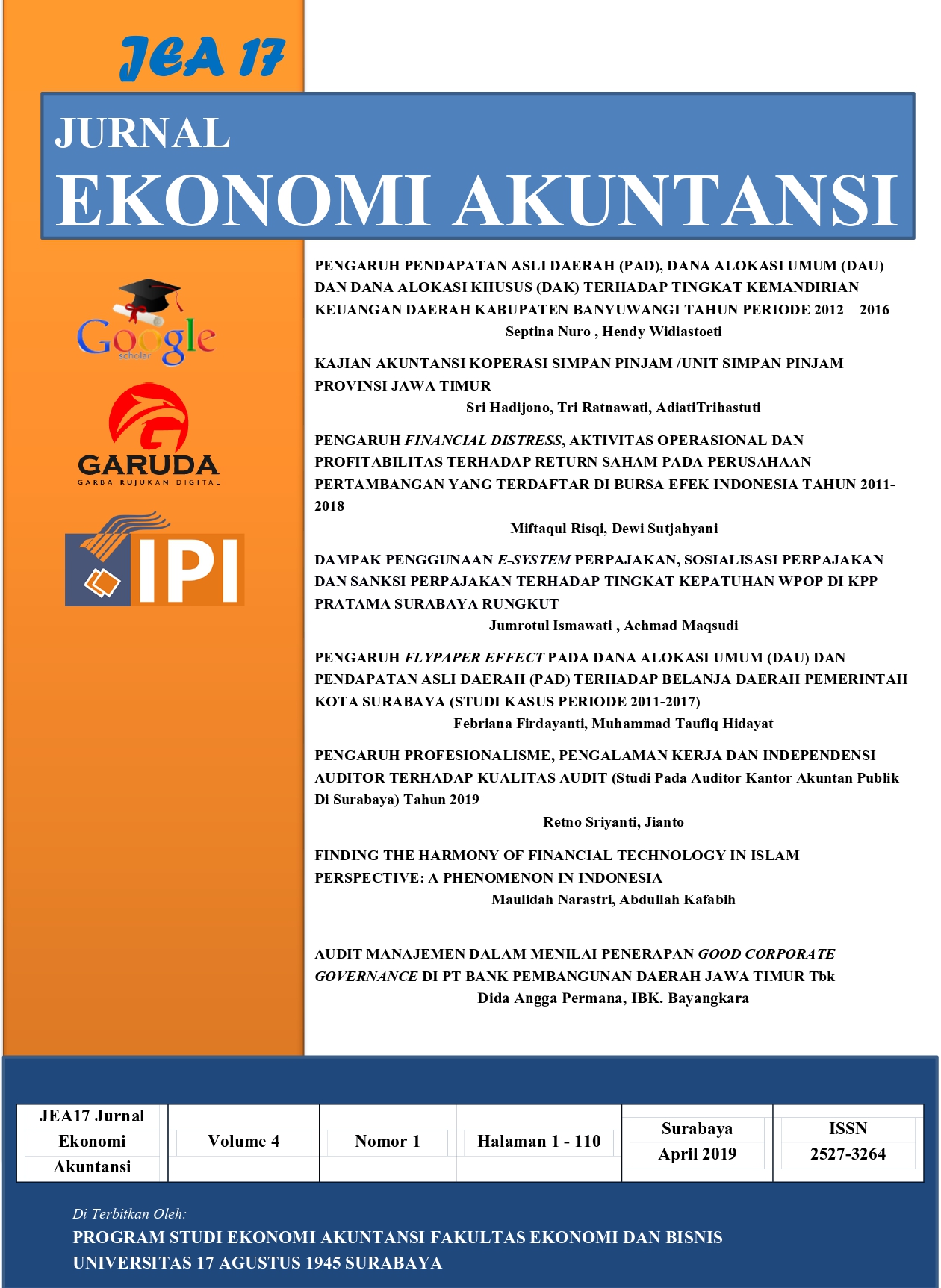FINDING THE HARMONY OF FINANCIAL TECHNOLOGY IN ISLAM PERSPECTIVE: A PHENOMENON IN INDONESIA
DOI:
https://doi.org/10.30996/jea17.v4i01.3290Abstract
ABSTRACT
The purpose of this article is to find out how harmony between the era of financial technology is compared with Islamic principles in Indonesia. Financial technology that is intended for humans to meet ever-increasing needs, increasingly rapid human mobilization, as well as increasing human activity. The method used in the discussion of this article is a critique of the phenomenon that developed in the era of financial technology in Indonesia as a developing country that supports the era of financial technology from developed countries. The literature used in this paper is published by national and international scientific journals and is supported by scientific books from various scientists. This article is expected to provide additional knowledge, become an opening point for further research, and be made as a guide in conducting business at various levels that discuss using financial technology.
Keyword: Financial Technology, Islamic Perspective, Regulation
Downloads
References
REFERENCE
Agustianto. (2004). Ekonomi Keuangan dan Perdagangan dalam Alqur'an.
Alsmadi, I., & Zarour, M. (2015). Building an Islamic Financial Information System Based on Policy Managements. Journal of King Saud University- Computer and Information Science , 364-375.
Bansal, S. (2014). Perspective of Technology in Achieving Financial Inclusion in Rural India. Procedia Economics and Finance , 472-480.
Carney, M. (2016). Enabling the FinTech transformation: Revolution, Restoration, or Reformation. BoE Speech .
Chandra, A. A. (2018, September 01). https://finance.detik.com/moneter/d-4192994/ojk-terbitkan-aturan-baru-soal-fintech-ini-isinya. Retrieved June 12, 2019, from https://finance.detik.com: https://finance.detik.com/moneter/d-4192994/ojk-terbitkan-aturan-baru-soal-fintech-ini-isinya
Fatwa Dewan Standar Majelis Ulama Indonesia Nomor 117/DSN-MUI/II/2018 Mengenai Layanan Pembiayaan Berbasis Teknologi Informasi Berdasarkan Prinsip Syariah. (2018). Indonesia.
Korwatanasakul, W. (2018). Factors Influencing Technology Adoption of People with Visual Impairment: Case Study of Financial Transactions Through an Automatic Teller Machine (ATM). Kasetsart Journal of Social Science , 1-6.
Meifang, Y., He, D., & Zheng Xianrong, X. X. (2018). Impact of Payment Technology Innovations on the Traditional Financial Industry: A Focus on China. Journal of Technological Forecasting and Social Change , 199-2017.
Mohammed, N. F., Fahmi, F. M., & Ahmad, A. E. (2015). The Influence of AAOIFI Accounting Standards in Reporting Islamic Financial Institutions in Malaysia. Procedia Economics and Finance , 418-424.
Ozili, P. K. (2018). Impact of Digital Finance on Financial Inclusion and Stability. Borsa Istanbul Review , 329-340.
Pekerti, R. D., & Herwiyanti, E. (2018). Transaksi Jual Beli Online dalam Perspektif Syariah Madzhab Asy-Syafi’i. Jurnal Ekonomi, Bisnis, dan Akuntansi (JEBA) Volume 20 Nomor 02 .
Peraturan Bank Indonesia Nomor 19/12/PBI/2017 Tentang Penyelenggaraan Teknologi Finansial. (2017). Indonesia.
Peraturan Otoritas Jasa Keuangan Nomor 77/POJK.01/Tahun 2016 Mengenai Layanan Teknologi Informasi. (2016). Indonesia.
Peraturan Otoritas Jasa Keuangan Republik Indonesia Nomor 13/POJK.02/2018 Mengenai Inovasi Keuangan Digital di Sektor Jasa Keuangan. (2018). Indonesia.
Sahroni, O. (2018). Fatwa Dewan Standar Majelis Ulama Indonesia Nomor 117/DSN-MUI/II/2018 Mengenai Layanan Pembiayaan Berbasis Teknologi Informasi Berdasarkan Prinsip Syariah. Indonesia.
Salman, A., & Nawaz, H. (2018). Islamic Financial System and Conventional Banking: A Comparison. Arab Economic and Business Journal , 155-167.
Sulayman, H. I. (2015). Growth and Sustaining of Islamic Finance Practice in the Financial System of Tanzania: Challenges and Prospects. Procedia Economics and Finance , 361-366.
Yarli, D. (Juli-Desember 2018). Analisis Akad Tijarah pada Transaksi Fintech Syariah dengan Pendekatan Maqashid. Jurnal Pemikiran Hukum dan Hukum Islam YUDISIA, Vol. 9 No. 2 .
Zain, M. M., Darus, F., & Ramli, A. (2015). Islamic Ethical Practices and the Marketplace: evidence from Islamic Financial Institutions. Procedia Economics and Finance , 266-273.
Downloads
Published
Issue
Section
License
Authors whose manuscript is published will approve the following provisions:
- The right to publication of all journal material published on the JEA17: Jurnal Ekonomi Akuntansi website is held by the editorial board with the author's knowledge (moral rights remain the property of the author).
- The formal legal provisions for access to digital articles of this electronic journal are subject to the terms of the Creative Commons Attribution-ShareAlike (CC BY-SA) license, which means JEA17: Jurnal Ekonomi Akuntansi reserves the right to store, modify the format, administer in the database, maintain and publish articles without requesting permission from the Author as long as it keeps the Author's name as the owner of Copyright.
- Printed and electronically published manuscripts are open access for educational, research, and library purposes. In addition to these objectives, the editorial board shall not be liable for violations of copyright law.











